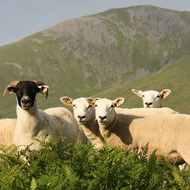Views sought on sheep health and nutrition

The survey seeks views in the common health and nutrition challenges faced by sheep farmers and producers.
A survey is seeking views on the common nutrition and health challenges faced by sheep farmers and producers.
The survey takes around 20 minutes to complete and has been developed by the European sheep network, Eurosheep.
Once the challenges have been identified, the findings will be used to develop solutions and best practices in a bid to improve flock health and nutrition.
Eurosheep has partners in eight countries, including Scotland's Rural College (SRUC), and is funded by Horizon 2020, the biggest EU Research and Innovation programme.
The overall aim of EuroSheep is to exchange existing knowledge between stakeholders at all stages of the supply chain in EU and Turkish sheep production, focusing on flock health management and nutrition management.
It held its first project meeting in Thessaloniki, Greece, at the end of January 2020, where the partners devised the work plan for the next three years.
Dr Claire Morgan-Davies, a livestock systems scientist at SRUC’s Hill & Mountain Research Centre, explains: “It is really important for EuroSheep to gather the views of the sheep industry at a European level.
“The first step of the project is to identify the main challenges farmers and producers face, and the needs they have, in terms of nutrition and health in their flocks. We can then address these and provide solutions to improve flock profitability.”
The survey can be accessed here.



 The Federation of Independent Veterinary Practices (FIVP) has announced a third season of its podcast, Practice Matters.
The Federation of Independent Veterinary Practices (FIVP) has announced a third season of its podcast, Practice Matters.